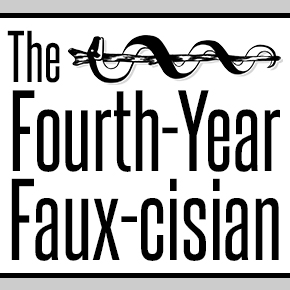“See, there’s two kinds of doctors… there’s the kind that gets rid of their feelings, and the kind that keeps them. If you’re gonna keep your feelings, you’re gonna get sick from time to time — that’s just how it works. People come in here and they’re sick and dying and bleeding, and they need our help. Helping them is more important than how we feel. But it’s still a pain the ass sometimes. Sometimes, I just want to quit and do somethin’ else.”
-Mark Greene, ER
I’ve realized recently that there are a few things about which medical school teaches you nothing. There’s the fabled four-year curriculum that all neophytes believe will make them into educated, caring, considerate and capable physicians. And then there’s the reality that most of what it is to really be a physician is learned in the “unwritten curriculum,” the things you learn from watching the residents, attendings and nurses. Handling death, seeing suffering and being unable to do anything about it, and how to handle the abuse that a day in the hospital sometimes throws at you — all of these are things you figure out on your own and hope you’re doing right.
Today, the Match list opened. I’m going to put in my list of programs I want to go to and in March, I find out where I go. And then on July 1, I become an emergency physician — terrified, marginally capable and hopefully guided as I try to take care of people. I’ve spent a lot of time recently watching season after season of ER, and I’ve come to realize something terrifying.
Three and a half years of medical school have hardened me. They’ve acted like a forge, providing tremendous heat and a constant pounding to beat out the ‘imperfections’ and to expose me to the wonders and terrors of clinical medicine. They’ve taken a humanistic person who read Wordsworth, Sarte and Dostovesky and replaced him with someone deeply familiar with the PERC rule and the CHADS2. I’ve become capable of taking care of patients to some degree; I walk with the strut of someone comfortable with much of daily patient care. My training has helped me save a couple of lives already, and will likely be responsible for saving many more over my career. But I can’t help but wonder what I’ve lost along the way.
The last patient I did CPR on died. I had my hands poised over her sternum when time of death was called. I walked out without a second thought as to the life that had just ended, moving on efficiently to the next task.
More than anything else that terrifies me. I’ve never been overtly emotional, but recently in the hospital it’s as though I’ve developed this protective Teflon coating that blunts both the great saves and the terrible losses. I can’t imagine functioning in a busy emergency department without it — the fear would probably render me catatonic. But the existence of this protective armor makes me wonder if I’ve become the soulless automaton I swore I would never become — so far from the physicians identified by Mark Greene and John Carter.
As my mind wanders down this tangent, I’m reminded of another patient I’d seen that same day. He was an elderly gentleman, a veteran of World War II and Vietnam. A patrician gentleman with a regal bearing, I was admitting him to the hospital for pulmonary edema. When I told him, this man who’d survived the landing on Normandy and pushed on despite seeing scores of his friends die, broke down in tears. He was terrified he was losing his independence to a disease that crept on insidiously with age. My heart broke a little inside, because he reminded me of my own grandfather, a 85 year old general who hated the hospital. So I sat with him for 10 minutes just talking, and holding back tears.
I do set the tone, I do decide how I’m going to see and manage and handle the emotional onslaught contained in the walls of an emergency department every day. And despite how useful my emotional armor is, I think I need to continue to live in fear of it. The day I grow to like it too much and the day I can’t feel my heart break a little for any patient, is I think the day that I should hang up my stethoscope.
May that day be far, far away.
The Fourth-Year Faux-cisian deals with the trenches of medicine, the dirty details and the inglorious scut, as well as with the sublime and transcendent moments. The posts I write are about medicine, humanism, life, philosophy, and most of all the ruminations of a young doctor-to-be as he embarks upon the transformative journey of becoming a physician while attempting to hold onto his humanity.



